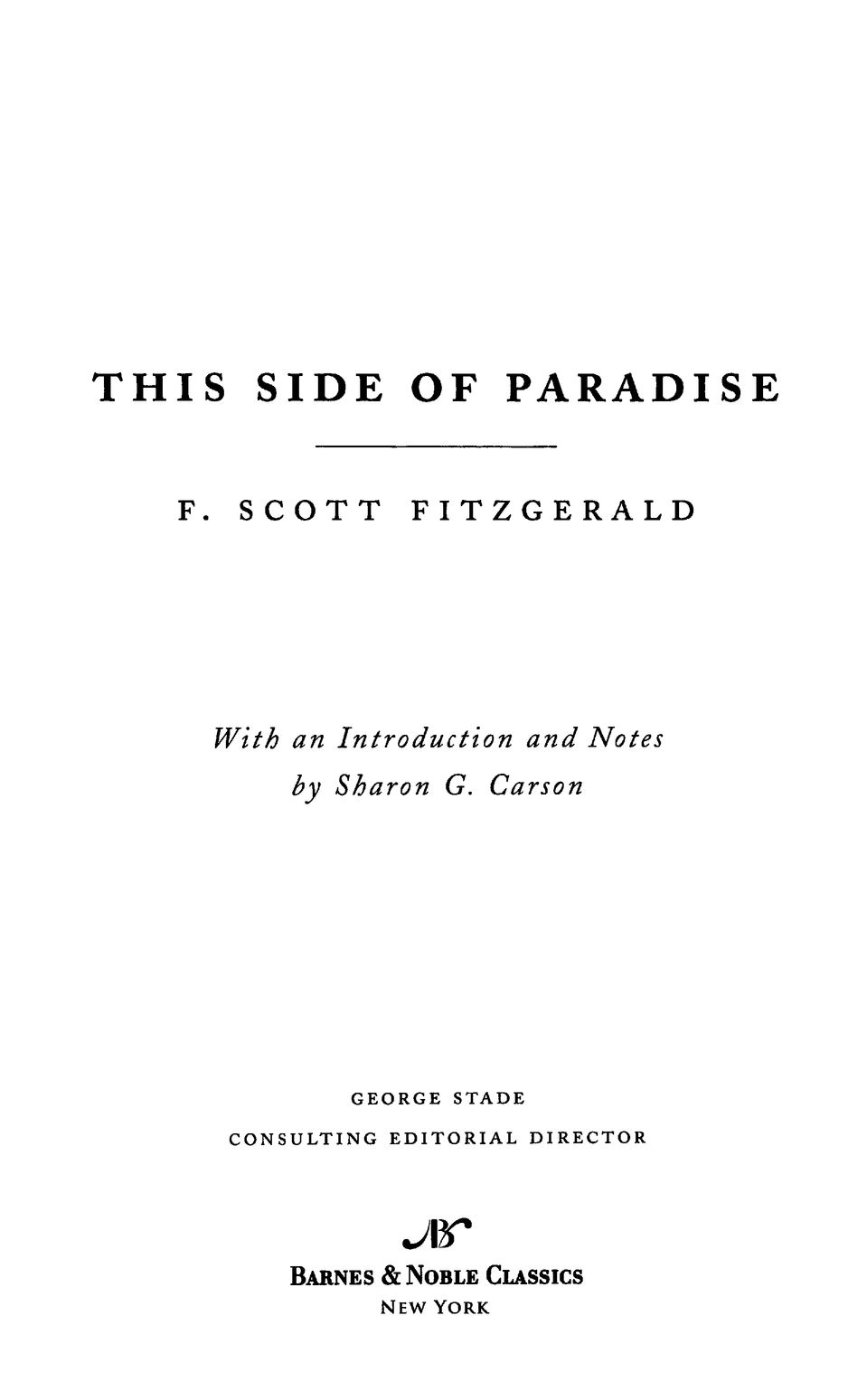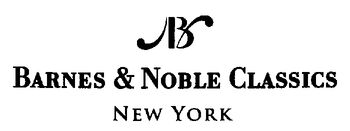This Side of Paradise (Barnes & Noble Classics Series)
Read This Side of Paradise (Barnes & Noble Classics Series) Online
Authors: F. Scott Fitzgerald

BOOK: This Side of Paradise (Barnes & Noble Classics Series)
13.42Mb size Format: txt, pdf, ePub

Table of Contents
FROM THE PAGES OF
THIS SIDE OF PARADISE
THIS SIDE OF PARADISE
“I want to go to Princeton,” said Amory. “I don’t know why, but I think of all Harvard men as sissies, like I used to be, and all Yale men as wearing big blue sweaters and smoking pipes.” (pages 24-25)
He was resentful against all those in authority over him, and this, combined with a lazy indifference toward his work, exasperated every master in school. (page 27)
D’Invilliers was partially taken in and wholly delighted. In a good-natured way he had almost decided that Princeton was one part deadly Philistines and one part deadly grinds, and to find a person who could mention Keats without stammering, yet evidently washed his hands, was rather a treat. (page 48)
“You’ve just had your eyes opened to the snobbishness of the world in a rather abrupt manner. Princeton invariably gives the thoughtful man a social sense.” (page 78)
“He’s the first contemporary I’ve ever met whom I’ll admit is my superior in mental capacity.” (page 121)
All life was transmitted into terms of their love, all experience, all desires, all ambitions, were nullified—their senses of humor crawled into corners to sleep; their former love-affairs seemed faintly laughable and scarcely regretted juvenalia. (page 175)
“It’s just—us. We’re pitiful, that’s all. The very qualities I love you for are the ones that will always make you a failure.” (page 181)
“Any rich, unprogressive old party with that particularly grasping, acquisitive form of mentality known as financial genius can own a paper that is the intellectual meat and drink of thousands of tired, hurried men, men too involved in the business of modern living to swallow anything but predigested food. For two cents the voter buys his politics, prejudices, and philosophy.” (page 201)
Probably more than any concrete vice or failing Amory despised his own personality—he loathed knowing that to-morrow and the thousand days after he would swell pompously at a compliment and sulk at an ill word like a third-rate musician or a first-class actor. (page 242)
“Yes—I was perhaps an egotist in youth, but I soon found it made me morbid to think too much about myself” (page 243)
He found something that he wanted ... not to be admired, as he had feared; not to be loved, as he had made himself believe; but to be necessary to people, to be indispensable; he remembered the sense of security he had found in Burne. (page 247)
“Very few things matter and nothing matters very much.” (page 247)
“I’m restless. My whole generation is restless. I’m sick of a system where the richest man gets the most beautiful girl if he wants her, where the artist without an income has to sell his talents to a button manufacturer.” (page 256)
“I know myself,” he cried, “but that is all.” (page 261)


Published by Barnes & Noble Books
122 Fifth Avenue
New York, NY 10011
122 Fifth Avenue
New York, NY 10011
This Side of Paradise
was first published in 1920.
was first published in 1920.
Published in 2005 by Barnes & Noble Classics with new Introduction,
Notes, Biography, Chronology, Inspired By, Comments & Questions,
and For Further Reading.
Notes, Biography, Chronology, Inspired By, Comments & Questions,
and For Further Reading.
Introduction, Notes, and For Further Reading
Copyright © 2005 by Sharon G. Carson.
Note on F. Scott Fitzgerald, The World of F. Scott Fitzgerald
and
This Side of Paradise,
Inspired by
This Side of Paradise,
and Comments & Questions
and
This Side of Paradise,
Inspired by
This Side of Paradise,
and Comments & Questions
Copyright © 2005 by Barnes & Noble, Inc.
All rights reserved. No part of this publication may be reproduced
or transmitted in any form or by any means, electronic or mechanical, including
photocopy, recording, or any information storage and retrieval system,
without the prior written permission of the publisher.
or transmitted in any form or by any means, electronic or mechanical, including
photocopy, recording, or any information storage and retrieval system,
without the prior written permission of the publisher.
Barnes & Noble Classics and the Barnes & Noble Classics
colophon are trademarks of Barnes & Noble, Inc.
colophon are trademarks of Barnes & Noble, Inc.
This Side of Paradise
ISBN-13: 978-1-59308-243-7 ISBN-10: 1-59308-243-6
eISBN : 978-1-411-43327-4
LC Control Number 2005922122
Produced and published in conjunction with:
Fine Creative Media, Inc.
322 Eighth Avenue
New York, NY 10001
Fine Creative Media, Inc.
322 Eighth Avenue
New York, NY 10001
Michael J. Fine, President and Publisher
Printed in the United States of America
QM
1 3 5 7 9 10 8 6 4 2
FIRST PRINTING
F. SCOTT FITZGERALD

Francis Scott Key Fitzgerald was born in St. Paul, Minnesota, on September 24, 1896, to Edward and Mollie McQuillan Fitzgerald. His father was an unsuccessful businessman who came from an old family with roots in Maryland. His mother was the daughter of an Irish immigrant who built a successful wholesale grocery business in St. Paul. Scott was named after his father’s distant cousin, the author of the “Star-Spangled Banner,” and his mother was proud of the family connection to the Keys. Before Scott reached school age his father’s wicker furniture factory had failed, and the family moved to upstate New York to follow Edward’s sales job with Proctor and Gamble. In 1908 Edward lost his position, and the family moved back to St. Paul; from that point on McQuillan money supported them.
At a young age, Scott showed a talent for writing: At thirteen he published his first story in his school journal. And while studying at an elite Catholic prep school in New Jersey he published three stories and wrote several plays. Fitzgerald enrolled in Princeton University in 1913, where he contributed to campus magazines and wrote scripts and lyrics for campus musicals. His devotion to extracurricular activities forced him to leave Princeton because of poor grades. After America entered World War I, he enlisted in the army; while stationed at a military camp in Kansas, he began writing
The Romantic Egotist,
his first novel.
The Romantic Egotist,
his first novel.
Discharged from the army after the war (having never seen active service), Fitzgerald revised his novel and renamed it
This Side of Paradise;
it was published by Charles Scribner’s Sons in 1920. That same year Scott married the willful, unpredictable Zelda Sayre, whom he had met in 1918 after being transferred to an army base in Alabama. Fitzgerald’s first novel—immensely popular with the war generation—brought him instant fame, although many critics of the day debated its literary merits. He quickly developed notoriety as a carouser and a playboy—impressions he did little to diminish—but his reputation for heavy drinking and continual partying belied his writerly discipline, as evidenced by meticulous revisions of his novels and the numerous short stories he wrote throughout his life. In 1922 he followed his successful debut as a novelist with
The Beautiful and Damned,
a tale about a couple whose lives end in dissipation while they sue for a large inheritance. With his early works Fitzgerald explored a theme he would return to repeatedly: the effects of wealth and power on the people who possess them.
This Side of Paradise;
it was published by Charles Scribner’s Sons in 1920. That same year Scott married the willful, unpredictable Zelda Sayre, whom he had met in 1918 after being transferred to an army base in Alabama. Fitzgerald’s first novel—immensely popular with the war generation—brought him instant fame, although many critics of the day debated its literary merits. He quickly developed notoriety as a carouser and a playboy—impressions he did little to diminish—but his reputation for heavy drinking and continual partying belied his writerly discipline, as evidenced by meticulous revisions of his novels and the numerous short stories he wrote throughout his life. In 1922 he followed his successful debut as a novelist with
The Beautiful and Damned,
a tale about a couple whose lives end in dissipation while they sue for a large inheritance. With his early works Fitzgerald explored a theme he would return to repeatedly: the effects of wealth and power on the people who possess them.
Other books
Gweilo by Martin Booth
Wrong by Stella Rhys
Alix (The Coven's Grove Chronicles #1) by Virginia Hunter
Captain of My Heart by Harmon, Danelle
Trigger Gospel by Harry Sinclair Drago
Paper Chasers by Mark Anthony
Aegis Incursion by S S Segran
The Darkest Day by Tom Wood
Deep Down True by Juliette Fay
Duty Before Desire by Elizabeth Boyce